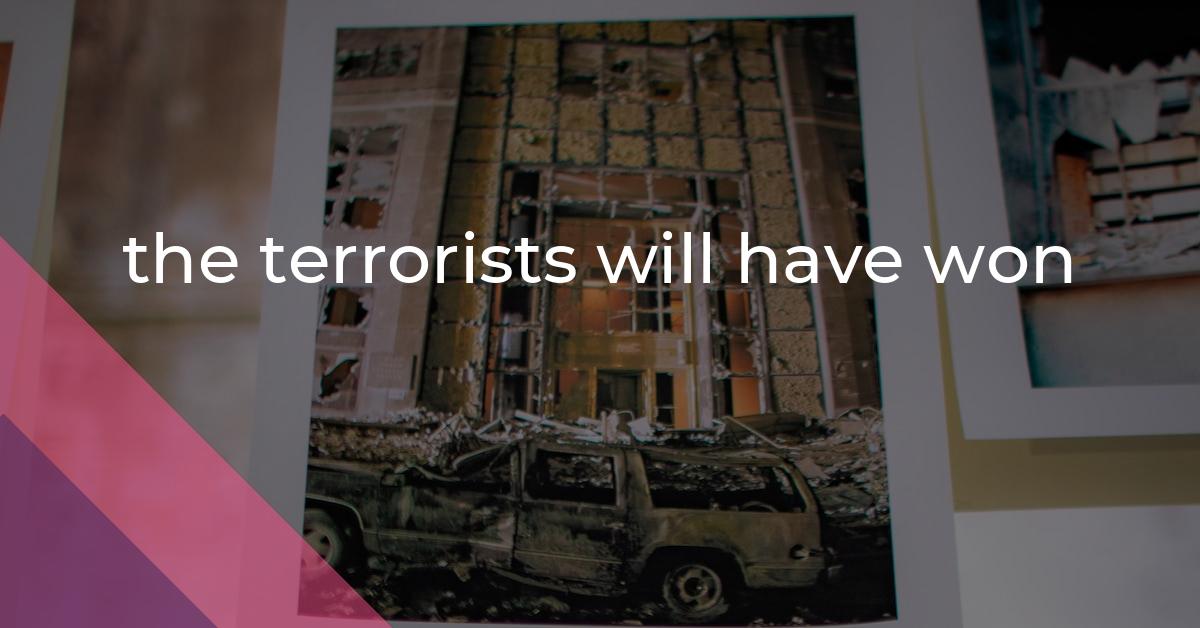the terrorists will have won: Idiom Meaning and Origin
What does ‘the terrorists will have won’ mean?
The idiom "the terrorists will have won" means that if we let fear control us and our actions, then we are giving power to the terrorists and allowing them to achieve their goals.

Idiom Explorer
The idiom "win the battle, but lose the war" means to achieve a small victory or success in a specific situation, but ultimately suffer a larger or more important defeat in the overall context or long-term outcome.
The idiom "upper hand" refers to having an advantage or being in control of a situation. It implies having more power, influence, or authority over others.
The idiom "under control" means to have a situation managed or regulated, resulting in a state of calmness or order.
The idiom "two steps ahead" means being well-prepared and anticipating future events or actions.
The idiom "turn the tide" means to change the course or direction of a situation, typically in a positive way, especially when it seemed to be going against someone or something.
The idiom "turn the tables" means to reverse a situation or gain an advantage over someone who had previously had the upper hand.
The idiom "turn out" means to have a specific result or outcome, often different from what was expected or predicted.
The idiom "tremble and obey" means to show fear or submission in the face of authority or power.
Unveiling the Terrorists' Core Triumph
The idiom "the terrorists will have won" is a commonly used phrase in the English language, especially in the United States. It is a figurative expression that conveys a specific meaning within the context of terrorism and its effects on society. The idiom suggests that succumbing to fear and altering one's way of life in response to acts of terrorism grants the perpetrators a victory, regardless of the outcome of their initial acts.
This idiom is closely related to the idiom "win the battle, but lose the war." Both expressions emphasize the idea that focusing solely on short-term victories without considering the long-term implications can ultimately lead to defeat. In the context of terrorism, this means that even if the terrorists are caught or their attacks are thwarted, if society allows fear to dictate their actions and compromise their principles, the terrorists still achieve their goal of spreading terror and disrupting normal life.
Another related idiom is "put the fear of God into." This expression refers to instilling a deep sense of fear and awe into someone. In the context of terrorism, this idiom can be seen as a warning about the psychological impact of acts of terror. When people are afraid, they may be more likely to make irrational decisions, give up their freedoms, or engage in discriminatory practices. By doing so, they unintentionally grant the terrorists a victory by achieving their goal of spreading fear and division.
When examined closely, the idiom can be viewed as a commentary on the psychological and social impact of terrorism. It implies that if individuals or society as a whole allow fear to dictate their actions, thus compromising their values and principles, then the underlying goals of the terrorists have been achieved without them having to commit further acts of terror.
It is crucial to understand that the idiom should not be interpreted as a call to disregard genuine concerns about safety and security. Instead, it serves as a reminder to resist the temptation of relinquishing personal freedoms and engaging in discriminatory practices in response to acts of terrorism.
By analyzing the idiom, it becomes evident that it is rooted in deep cultural and historical contexts. It is likely to have gained prevalence and significance due to the heightened global attention on terrorism, particularly after the events of 9/11 in the United States. The idiom has permeated public discourse and serves as a concise way to convey a complex message about the balance between security and societal values.
Furthermore, the idiom highlights the power of language in shaping perceptions and responses to terrorism. It underscores the notion that dialogue and communication play a crucial role in preserving societal unity and resilience in the face of adversity.
Although the idiom appears straightforward, it opens up a range of questions and considerations. For instance, how do we define victory for the terrorists? Is the impact of terrorism solely measured in terms of the physical harm caused, or does it also encompass the psychological and emotional toll on individuals and society? Furthermore, the idiom prompts us to examine the fine line between maintaining security and preserving civil liberties.
The idiom "the terrorists will have won" serves as a powerful reminder to remain steadfast in the face of terrorism, maintaining our values and principles as a society. It encapsulates the notion that bending to fear only plays into the hands of the perpetrators, allowing them to achieve their goals without further acts of terror. As we navigate the complexities of the modern world, the idiom challenges us to strike a delicate balance between security and the preservation of our fundamental rights and freedoms.
Example usage
Examples of how the idiom "the terrorists will have won" can be used in a sentence:
- If we start living in fear and giving up our freedoms, the terrorists will have won.
- By succumbing to anger and violence, we are playing into the hands of the terrorists, and they will have won.
- If we allow hate and prejudice to divide us, the terrorists will have achieved their goal, and they will have won.
More "Defeat" idioms



